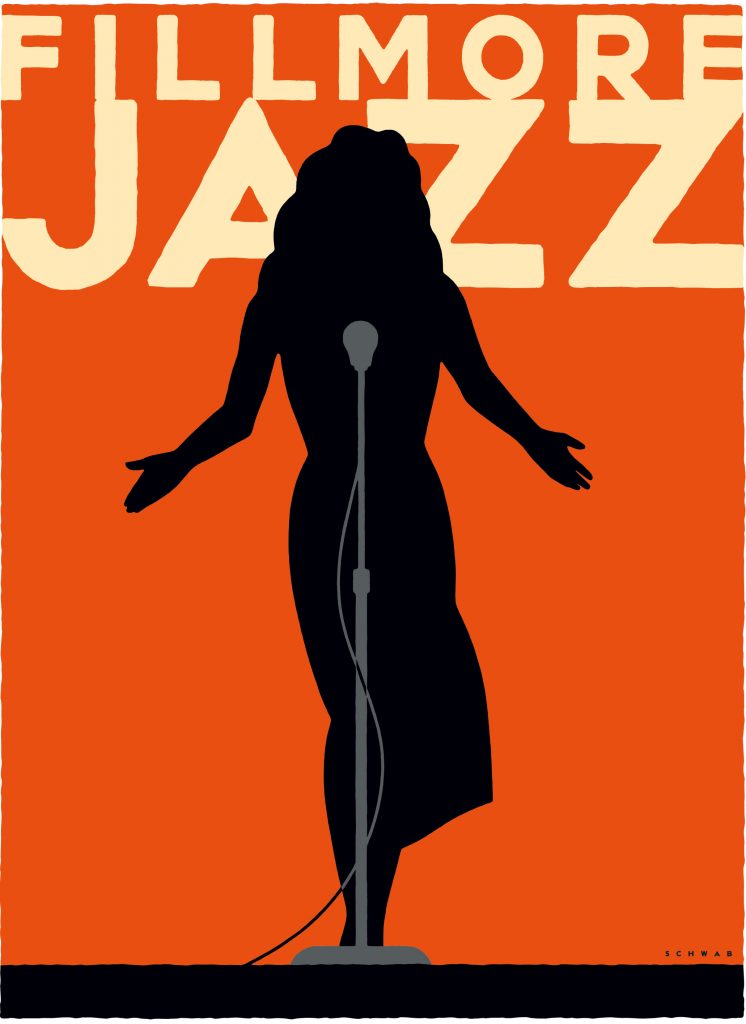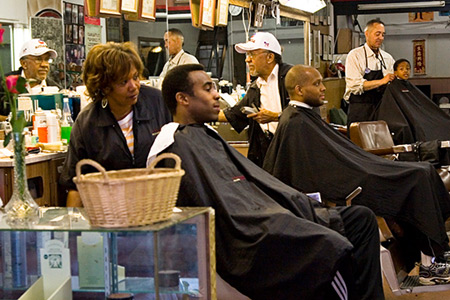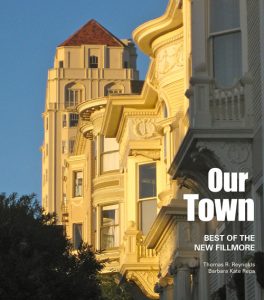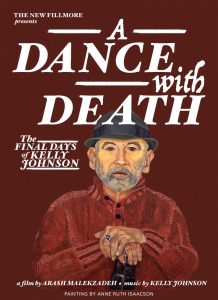
Photograph of New Chicago Barbershop #3 by Kathryn Amnott
By Chris Barnett
SAM JONES, aka “I’m just a Joe named Sam,” wandered into the tiny three-chair Esquire Barber Shop at 1826 Geary one recent Saturday afternoon looking slightly stunned. Then Elijah Brown, a 21-year-old entrepreneur, stepped in the door with a quizzical look. A gent named Tim, a man of few words, came in a few minutes later, squinted, looked around, sat down in the porcelain and leather chair and asked, “Whazzup, whazzup?”
Good question.
All three men and a parade of others that day had gone first to the New Chicago Barber Shop #3, a fixture at 1515 Fillmore Street for 60 years, for their regular trims and were shocked to find it closed and the phone disconnected. But they weren’t left entirely in the lurch. Wired to a metal security curtain were hand-lettered signs announcing that Kevin had moved to a shop at 1315 Fillmore at Eddy, Bobby had relocated to 1045 Fillmore and, on a printed poster, Al and Gail announced they were now cutting hair around the corner at the Esquire.
Al Stephens, who worked at the now-shuttered shop for 47 years, and Gail Pace, who worked there for 28, say they can’t explain why the shop closed. Charles Spencer, the shop’s current owner, cannot be reached.

After the barbershop closed, signs pointed the way to other nearby shops.
But an agent for the landlord says Spencer was six months behind in his rent and the building owner’s patience ran out.
“Charles is a terrific person, but he had a flawed business plan for today,” says Justin Barton, property manager with Keegan & Coppin, the company that oversees the building for its owner, the estate of Regina and Bert Kortz. “The demographics of the neighborhood have changed and people have lost sight of the Fillmore District’s culture.”
While Fillmore shop owners a few blocks north have been forced out by rising rents, Barton says the barbershop’s $2,300 a month rent had not increased for five years. “The Kortz family took great pride in its tenants and it did not impose financial burdens on them,” says Barlow, who adds he’s looking to re-lease the 1,500-square-foot space to someone “who will carry on the legacy of distinctive, neighborhood-minded stores in this historic African American community.”
Now shuttered and silent, with papers and mail piling up inside and outside its door and a dead plant in the front window shedding yellowed leaves, the New Chicago was for decades far more than a barbershop, say locals and longtime customers. “It was an institution, an icon on this street,” says Sam Yip, whose family has owned Progress Cleaners next door for 37 years. “It was a town hall, a gathering place, a hangout for people who would drop by and meet their friends and talk with the barbers even if they didn’t need a haircut that day,” he says. “The black community will feel a loss.”
Another shop owner adds: “Charles was soft spoken and liked — but maybe not by everyone. He wasn’t a barber, but he used the barbershop for political fundraising and supported certain people over others.”
Spencer became something of a neighborhood kingmaker who raised money and drummed up support for Ross Mirkarimi, the former District 5 supervisor who is now San Francisco’s sheriff, and for Cristina Olague, who was appointed to succeed Mirkarimi, but then defeated when she ran for election. Spencer was president of the African American Democratic Club and president of the merchants association in the jazz district for several years.
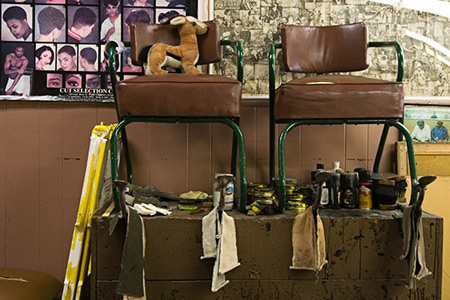
Photograph of the shoe shine stand at New Chicago Barber Shop #3 by Kathryn Amnott
Some say Spencer’s eviction for failure to pay the rent cuts a deep wound. He had held a senior position at Charles Schwab & Co., but cashed out and invested his funds and his family’s money in the landmark shop. “He wanted to be an independent business owner and control his own destiny,” says Yip. “He was tired of working for someone else.”
His neighbor directly across the street, Agonafer Shiferaw, who owns the Rasselas jazz club, praises Spencer for trying to “preserve and protect” the barbershop and “the street’s African American heritage” through his community and political work. “Charles supported the neighborhood and he subsidized the barbershop out of his own pocket, but the city never found a way to support him at all,” says Shiferaw.
New Chicago Barber Shop #3 was originally opened on Ellis Street — one of several in the neighborhood at the time — by a barber from Chicago named Walker, says Robert Hardin, who cut, trimmed and shaved there for more than 45 years.
Hardin says Walker moved the shop to its current location at 1515 Fillmore in 1953 and survived years of tumult. Oldtimers say it was the only storefront on Fillmore south of Geary that didn’t shut its doors during the ’60s when block after block of ornate Victorian homes were torn down in the name of redevelopment.
“It stayed open during the hard times, the 18 to 20 percent interest years, the redevelopment years,” contends Hardin, who says Walker sold the shop to another barber named William McMillan, who ran it until his death in 1975. McMillan’s nephew, Reggie Pettus, worked as a barber there for more than 35 years; even after he retired a few years ago, he frequently stopped by the shop for the company and conversation.
There were plenty of good times, too, Hardin recalls. “Everybody who was anybody in the black community — musicians, artists, store owners — came in for a haircut,” he says. “People like Willie Brown and Jimbo from Bop City.” Even nobodies who became somebodies hung out there.
“I remember a young Danny Glover would come in and he was reading books on how to become an actor,” Hardin says.
When McMillan died, the shop went into probate and was run by his son and daughter. Hardin says he left 16 years ago and opened his own place at Divisadero and Golden Gate he called Chicago Barber Shop II, which he still owns and where he cuts hair every day.
Some alums of New Chicago carp that Hardin named his shop “Chicago” to ride on the coattails of his previous employer. He concedes he used the name to get immediate visibility for his new venture, but claims it was also a way of honoring the New Chicago’s legacy of fine barbering in the black community.
Despite the name, Hardin didn’t attempt to clone his former home. His shop is light and airy and attracts a younger clientele. He claims he had no choice. “If you’re walking down the street and you see change all around you,” he says, “if you don’t change, you’ll fall by the wayside.”
Back at the Esquire Barber Shop, client Tim says he was distressed about losing the New Chicago shop but grateful he found Al and Gail. “Barbershops aren’t supposed to close,” he says. “Barbers aren’t supposed to die or go away. When I first saw the signs, it was very upsetting.”
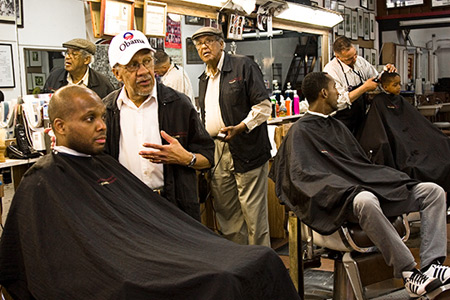
Photograph of New Chicago Barber Shop #3 in 2009 by Kathryn Amnott
Greg Evans, who sells office machines, recently came straight to the Esquire for his regular beard trim because Gail spared him the jolt of discovering his longtime barbershop was suddenly closed. “At my previous appointment, Gail quietly told me, ‘This will be the last haircut you’ll get here,’ ” Evans says. “Gail has been cutting my hair for six years and I’ll always follow her. When I come in, all I have to do is sit down in the chair. I don’t say a thing because she knows exactly what kind of cut and trim I want.”
Even Fillmore expats keep coming back to their barbershop to look sharp. Elijah Brown, the 21-year-old owner of the Designer Shoe Warehouse and another of Gail’s clients, trekked across the Bay Bridge to the shop where he had his hair cut when he was four years old. “I live in Oakland now, but when I come ‘home’ this is where I come for a good haircut,” Brown says. “I’m just lucky Gail is still here.”
“FILLMO, NO MO” — Opening sequence from KQED’s “The Fillmore” documentary features New Chicago’s Reggie Pettus.
Filed under: Body & Soul, Landmarks, Locals, Neighborhood History


